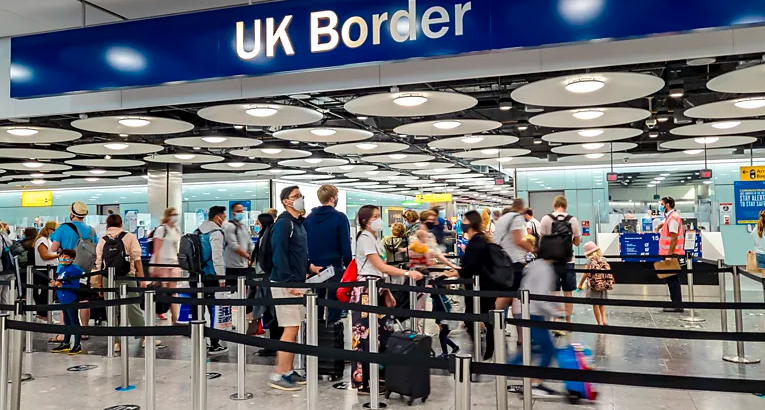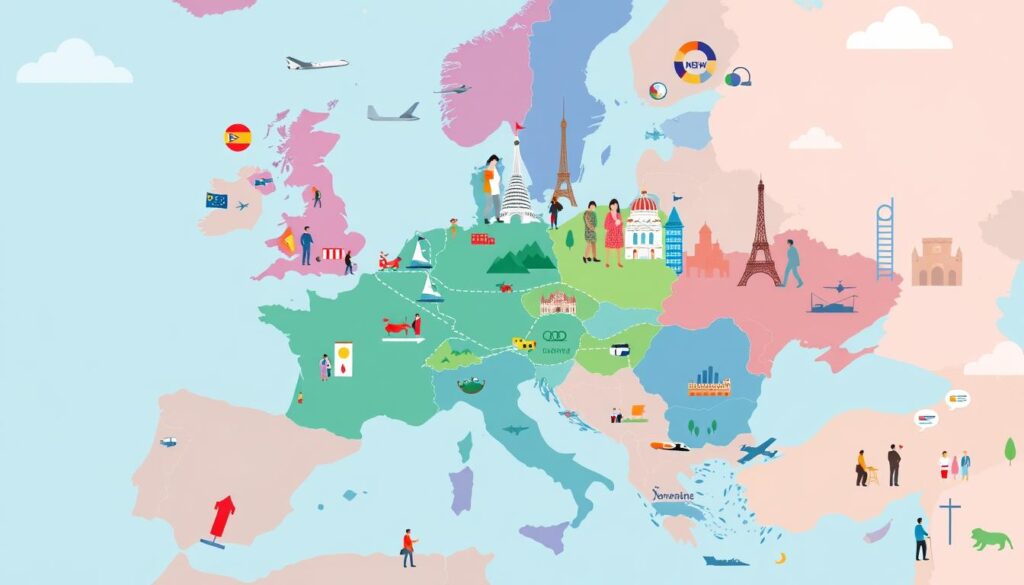Exploring Europe has been a big part of my life. The thought of new travel changes in 2025 is both exciting and a bit scary. This year, we’ll see big changes in traveling between the UK and the European Union.
Change can be hard, but it also brings new chances to make our travels better. We’ll learn to adapt and find new ways to enjoy our journeys.

We’ll look into the main changes in travel between the UK and Europe. We’ll talk about how Brexit will affect border controls. We’ll also explore the rise of digital passport systems and changing visa rules.
By understanding these changes, we can get ready for our future travels. We’ll make sure our trips are smooth and full of new experiences.
Keep Reading:
A Pro Freestyle Skier’s Ultimate Guide to La Plagne, France
Big Travel Changes coming to UK and European travel in 2025
Travel between the UK and Europe is set for big changes in 2025. The UK’s exit from the EU will affect many aspects of travel. This includes border controls and the possibility of flight delays.
UK citizens will face stricter checks at European borders. Expect longer lines and more detailed ID checks. This is because EU countries are boosting security.
Air travel between the UK and EU might also see changes. Flight times could be affected, and prices might go up. It’s important for travelers to keep up with news and plan their trips carefully.

Even with these changes, the UK and Europe are still top traveling spots. Travelers will need to be patient and flexible. By staying informed and planning ahead, they can have a better travel experience.
New Entry Requirements for UK Travelers to EU Countries
The UK’s relationship with the European Union is changing. This means big updates for UK citizens traveling to EU countries. The Schengen area, where traveling was free, now has new rules for UK passport holders.
UK travelers must now get a visa or an ETIAS permit to enter the Schengen area. This new rule is to make travel safer and easier for non-EU visitors, like UK citizens. The ETIAS, starting in 2025, will need UK travelers to apply online before their trip, like the ESTA for the US.

Also, UK citizens can only stay in the Schengen area for 90 days in 180 days. This is a big change from before. It means UK travelers need to plan carefully for longer stays in EU countries.
These new rules will affect traveling plans for UK citizens. It’s important to stay updated and prepared for these changes. This will help for a smooth trip across Europe.
Post-Brexit Border Control Transformations
After Brexit, the UK’s ties with the European Union have changed a lot. Now, there are new rules at borders. Travelers will see better security and new tech at border crossings.
One big change is stronger European border controls. New biometric systems and “smart gates” are being used. These smart gates check your face and fingerprints, making lines shorter.
Also, the EU is checking flights from the UK more closely. This might cause delays. So, travelers should plan to arrive early at borders.
These updates aim to make travel safer and easier. They use new tech to check people faster. This way, everyone can travel more smoothly while staying safe.
Digital Passport Systems and Smart Gates Revolution
The world is changing with new EU travel rules and post-Brexit tourism. The UK and EU are making travel easier with digital passport systems and smart gates at airports. These changes are big steps forward.
These new technologies make crossing borders smoother for everyone. Travelers can keep their info on mobile devices or smart cards. This means no more carrying around physical passports.
Smart gates use biometric scans to check who you are. This makes going through customs and immigration faster. It also makes travel safer and more efficient for all.
As we adjust to these new rules, digital passports and smart gates are changing travel in Europe. They promise a better experience for everyone.
Changes to Visa Requirements and Tourist Permits
The UK is leaving the Schengen area, which means big changes for travelers. UK citizens and those from the EU will face new rules for visiting each other’s countries. These changes will affect both fun trips and business travel.
UK travelers will soon need a visa to visit EU countries. This is a big change from the free travel they enjoyed before. They’ll have to follow new rules and apply for a Schengen visa. EU citizens visiting the UK will also see changes, possibly needing more documents and registrations.
The exact details of these changes are still being worked out. But it’s clear that traveling between the UK and EU will get harder. Both sides will need to keep up with the new rules to make their journeys smooth.
Transportation Updates Between UK and EU
Travelers between the UK and EU will see big changes after Brexit. Flight routes, train services, and ferry connections might change. New rules and policies will shape these changes.
UK-EU flight disruptions could happen. Airlines might adjust their schedules and routes. Travelers should watch for updates on their flight options, as some might stop or get more complicated.
Train and ferry services could also change. New border rules might make travel longer or less frequent. Tourists and business travelers should keep an eye on updates for a smooth trip.
The changes in transportation will affect post-Brexit tourism. Journeys might take longer, causing inconvenience. It’s important for everyone to stay informed about these changes to travel smoothly.
Impact on Business Travel and Working Rights
The UK and European Union are changing how we travel and work in 2025. This affects business travelers and job opportunities between the two areas. New rules on work permits and visas will change how companies and people work together across borders.
Starting in 2025, business travelers will face more rules and paperwork. People looking for jobs in the EU from the UK, or the other way around, will need special permits and visas. This means companies and job seekers need to understand new immigration rules and plan carefully for work and talent movement.
It’s important for businesses and individuals to keep up with Brexit travel rules, new EU travel rules, and UK visa needs. By adapting to these changes, companies can stay ahead and people can find jobs in different places. This helps keep the UK and EU working together economically.





